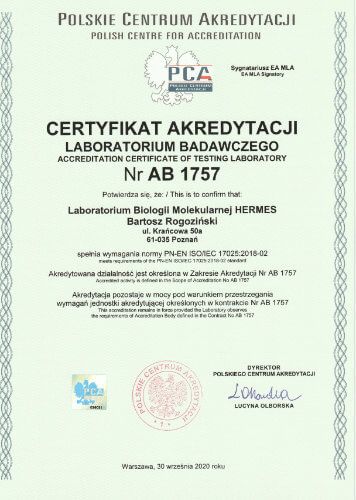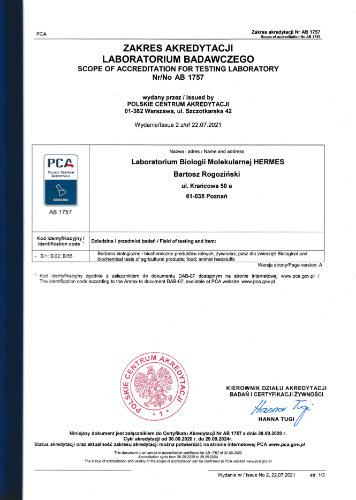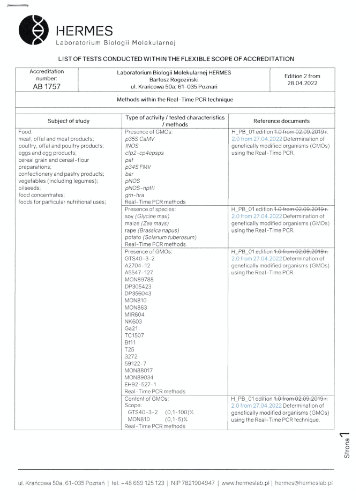Research for the presence and content of GMO in food and feed
THE OFFERING

Food, feed and agricultural products tests for the presence and content of GMOs: screening, qualitative tests – identification of GM events, quantitative tests

Species identification of organisms, incl. plants and animals in food, feed and agricultural products
Research for GMO in feed and foods
GMO testing is performed in two basic standards for the client to choose from depending on their individual needs:

Basic standard testing
Performed according to a simplified protocol, i.e.: a single DNA extraction from a sample; each test is repeated twice and the testing results report is presented in a simplified format (this is an appropriate option for routine internal production process control and raw resources testing).

Official control standard testing
Performed to reference methods i.e.: a double DNA extraction from a sample; the test is repeated twice for each DNA extraction (four repetitions in total) and the testing results report with interpretation is presented according to PN-EN ISO 24276:2007 + A1:2013-08. (appropriate for products introduced on the market, for official inspection purposes, product certification or confirming dubious testing results).
Stages of research for GMO
GMO identification is a complex multistage process, which is reflected in our testing offering. Testing has been divided into stages for your convenience, which allows you to choose and adjust the scope and the moment of concluding testing appropriately to your needs.

1
Tissue homogenization and crushing, extracting DNA from feed or food samples with purity control of the extracted DNA
Stage details
A mandatory stage that allows the lab to acquire appropriate testing analytes from samples.

2
Stage details
An essential testing stage focused on detecting most common GMO events in the sample.

3
Stage details
A recommended stage if basic screening provided positive results. It allows to differentiate, mark out and restrict the number of genetically modified events for subsequent verification.
An optional stage if basic screening has provided negative results, but it is necessary to perform a more comprehensive test to rule out the presence of less common GMO events.

4
Species identification (soybean, maize, rape, rice)
Stage details
A recommended stage if basic screening has provided positive results, when it is required to identify a GMO events present in the sample. It facilitates interpretation of screening results and helps to narrow down the number of GMO events necessary to verify in subsequent qualitative testing.

5
Testing for the presence of GMO events
Stage details
A stage implemented when it is necessary to identify GMO events; obligatory when qualitative testing is required. The number of varieties that require verification is derived from the scope and results of performed screening, the species identification stage and individual client preferences.

6
Quantitative indication of a single GMO events
Stage details
performed when it is necessary to quantify the percentage of the GMO events detected in the sample.
Contact us
The Quality
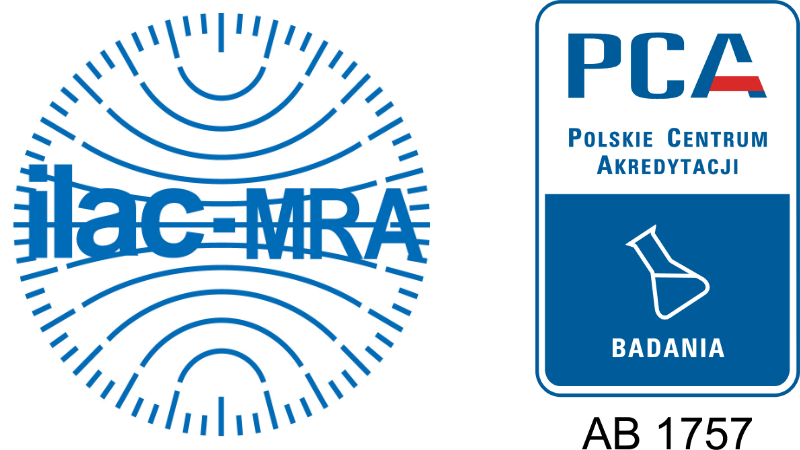
Business Profile HERMES Laboratory
HERMES Molecular Biology Laboratory offers specialised research services to business entities from the Food & Agriculture, Ecological and Feed industries, including manufacturers, processors, distributors, importers and exporters of raw materials, semi-finished and finished products, food and feed components and additives.
The Main Company Goals
Providing reliable research results.
Offering specialised research services at competitive prices.
Building client satisfaction through friendly, competent and efficient service.
Research and Development activity resulting in expanding the services offering by adding new, previously unavailable on the Polish market research options.
Tailoring of the research services on offer to specific individual needs of key clients.
Laboratory and research techniques

Modern Laboratory
The Company owns its own molecular biology laboratory organised according to PN-EN ISO 24276:2007 + A1:2013-08. All research services on offer are performed on the premises by experienced and authorized specialists.
The laboratory does not outsource testing of samples received from clients to any other entities.

Real-Time PCR
Hermes MB Laboratory uses the real-time PCR technique which allows to amplify DNA fragments collected from the samples which contain sequences characteristic of organisms identified in the test and simultaneously to detect reaction products with dyes or fluorescence probes.
Apart from the application in qualitative tests this technique allows to perform precise absolute and relative quantitative indication of sequences in the sample. The principles of the technique have been described in PN-EN ISO 22119:2011.

EURL Methods

Isolation DNA
Each testing must be preceded by DNA isolation from the sample.
The laboratory uses several different methods of DNA isolation, each time choosing the best method for the type of tested sample.
Laboratory and research techniques
The Company owns its own molecular biology laboratory organised according to PN-EN ISO 24276:2007 + A1:2013-08.
All research services on offer are performed on the premises by experienced and authorized specialists.
The laboratory does not outsource testing of samples received from clients to any other entities
Hermes MB Laboratory uses the real-time PCR technique which allows to amplify DNA fragments collected from the samples which contain sequences characteristic of organisms identified in the test and simultaneously to detect reaction products with dyes or fluorescence probes.
Apart from the application in qualitative tests this technique allows to perform precise absolute and relative
quantitative indication of sequences in the sample. The principles of the technique have been described in PN-EN ISO 22119:2011.
In GMO testing the laboratory relies on reference methods recommended by European Union Reference Laboratory for GMO (EURL). In the remaining tests we use our own methods or rely on commercially available diagnostic kits.
Each testing must be preceded by DNA isolation from the sample.
The laboratory uses several different methods of DNA isolation, each time choosing the best method for the type of tested
sample.



Research & Development
The company is involved in research and development activities, independently and in cooperation with other entities, with the aim to develop, optimise, validate and implement new qualitative and
quantitative testing methods based on the real-time PCR technique into our services portfolio.
Our main R&D interests concern:
developing simplex tests for species identification and detection of allergens,
developing multiplex qualitative testing methods,
developing quantitative detection methods for quantification of species in food products.



Research & Development
The company is involved in research and development activities, independently and in cooperation with other entities, with the aim to develop, optimise, validate and implement new qualitative and
quantitative testing methods based on the real-time PCR technique into our services portfolio.
Our main R&D interests concern:
developing simplex tests for species identification and detection of allergens,
developing multiplex qualitative testing methods,
developing quantitative detection methods for quantification of species in food products.
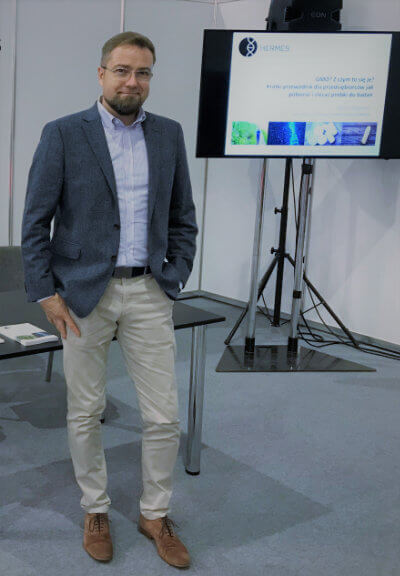
Bartosz Rogoziński
Founder HERMES Laboratory
My name is Bartosz Rogoziński. I’m a biotechnologist and commodity specialist and I have been professionally involved in feed and foods testing for genetically modified organisms (GMO) for almost 15 years. I have been responsible for conducting and supervising accredited testing in a laboratory accredited to PN-EN ISO 17025 and have served as an internal auditor for that system.
I belive that my extensive experience will allow me to provide you with the highest level of research service, which will find reflection in success and growth of your companies and will facilitate ongoing quality monitoring of the product you offer.
Write to us
HERMES Molecular Biology Laboratory Bartosz Rogoziński
ul. Krańcowa 50a, 61-035 Poznań
NIP 7821904947, REGON 382473679
www.hermeslab.pl
Contact us
Laboratory
ul. Krańcowa 50a, Poznań
Opening hours
mon. – fri: 9:00 – 17:00
hermes@hermeslab.pl
Phone
+48 669 125 123



